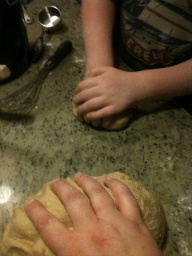So I've been poring over some older TFL posts on autolyse, as well as other web sites.
The traditional definition of autolyse means that only flour and water are combined to enhance flour hydration and gluten formation, with a host of other benefits.
One post I found said that yeast should not be included in an autolyse because it can potentially form too acidic of an environment, which may not be conducive to flavor (or possibly to gluten development). I can imagine that the addition of lots of leaven (yeast, preferement, etc) could cause problems with autolyse, but I have never experienced this myself.
My question is:
In your own experience, have you tried autolyse with yeast, as well as without? If so, what difference did it make in the final product for the same recipe? Note I'm not looking for theoretical answers here, i want to know if you were able to perceive a significant difference in the resulting bread.
For me, I guess my next step will be to run some experiments, and compare the results of autolysed doughs which contain levain vs. those which don't. Considering doughs are autolysed 20 min to 1 hour, those are the intervals that I will be working with.





